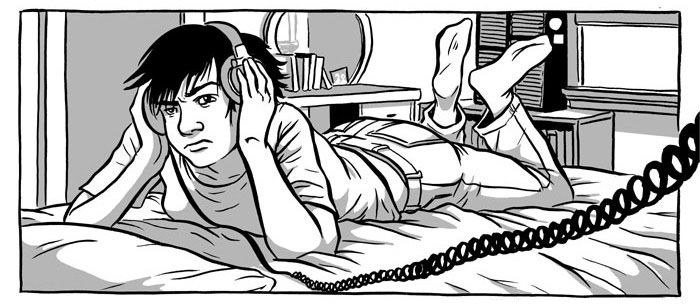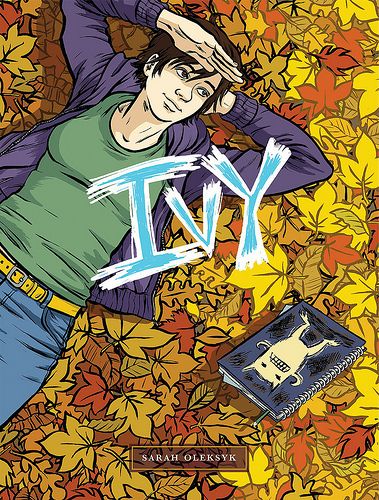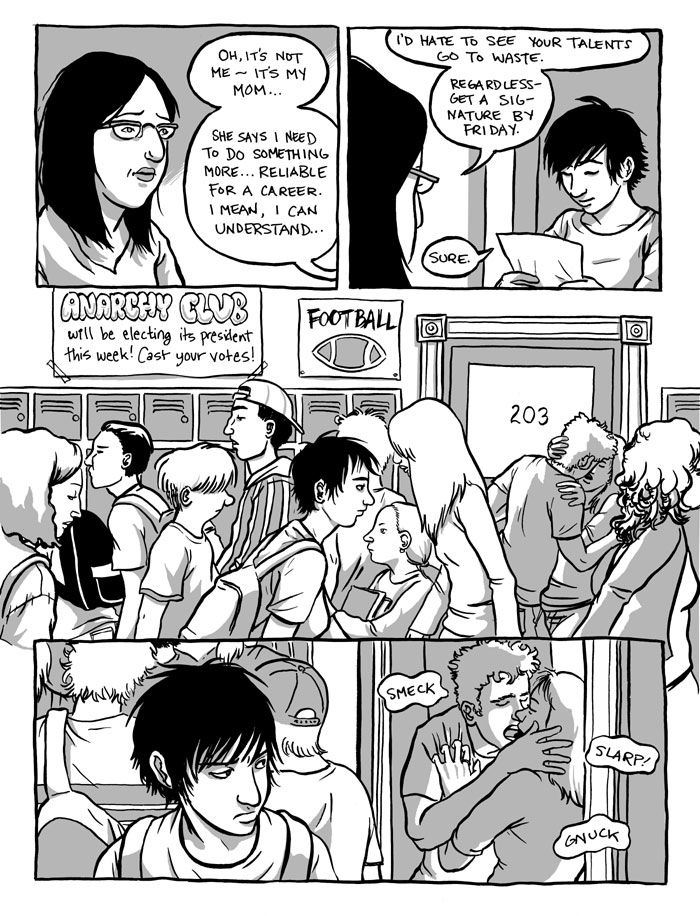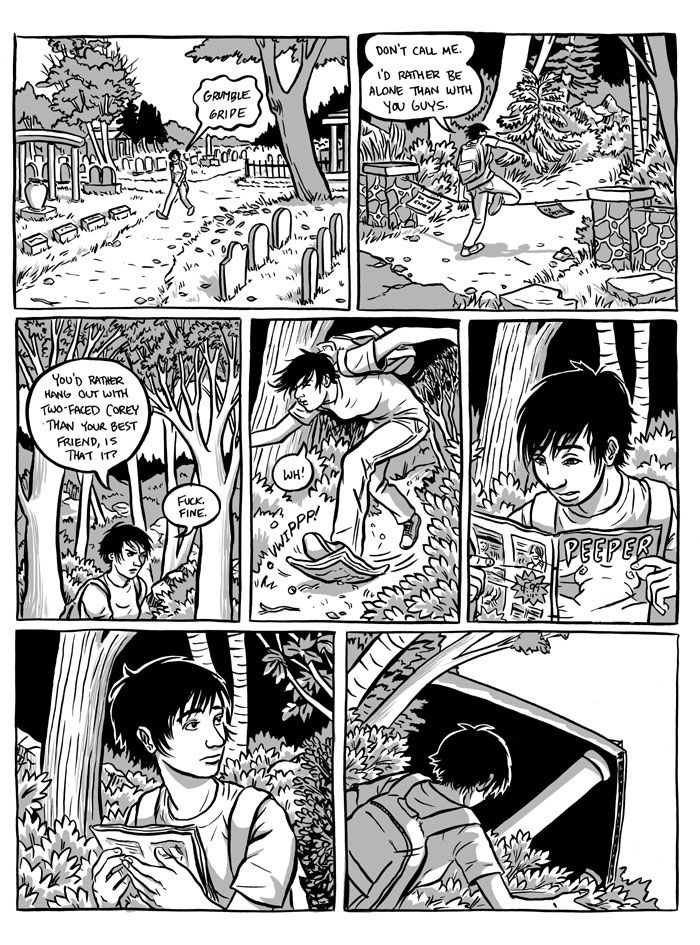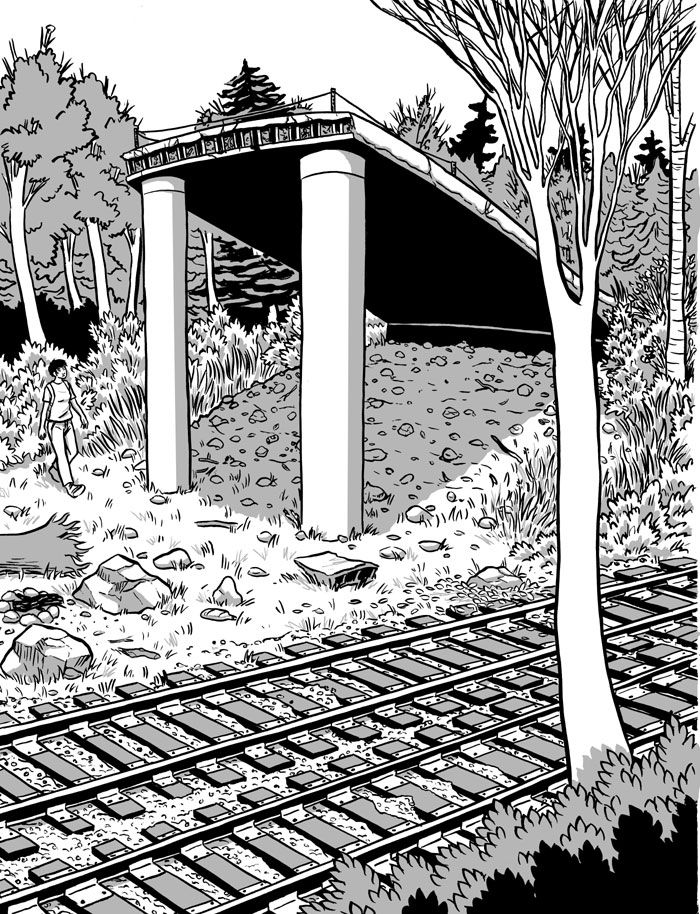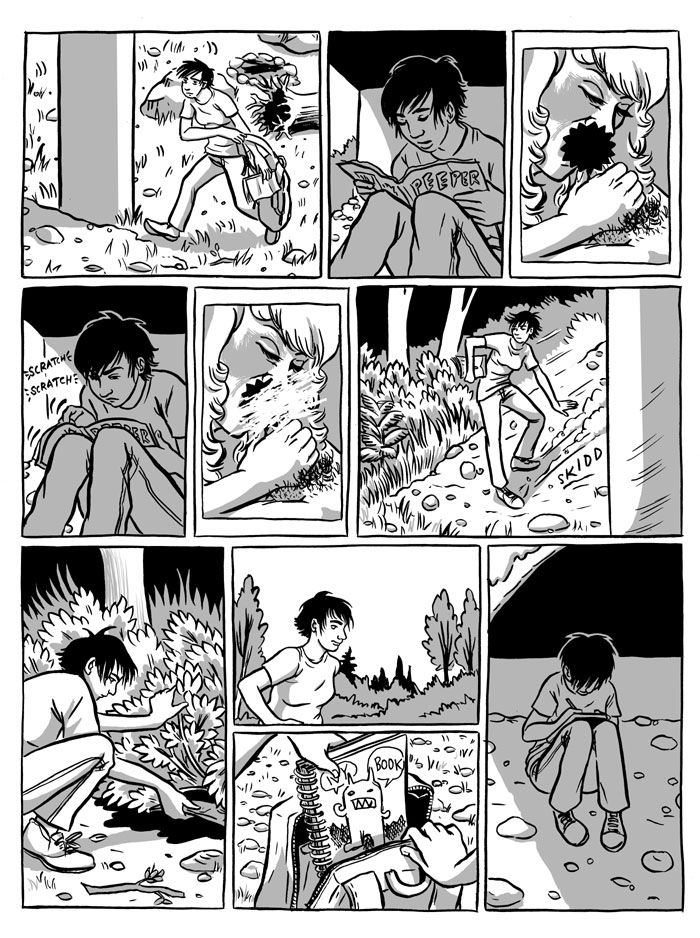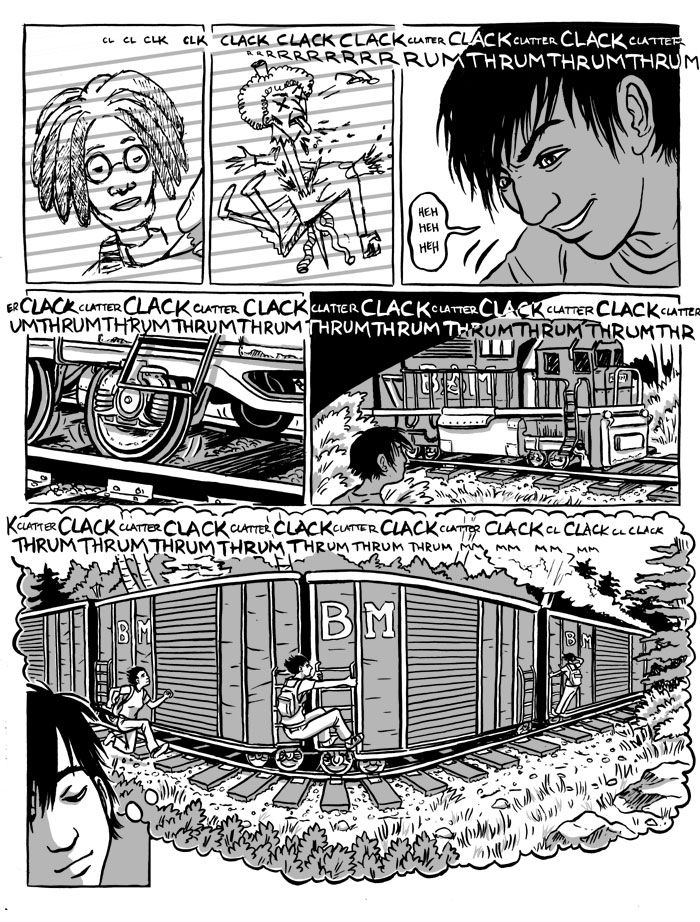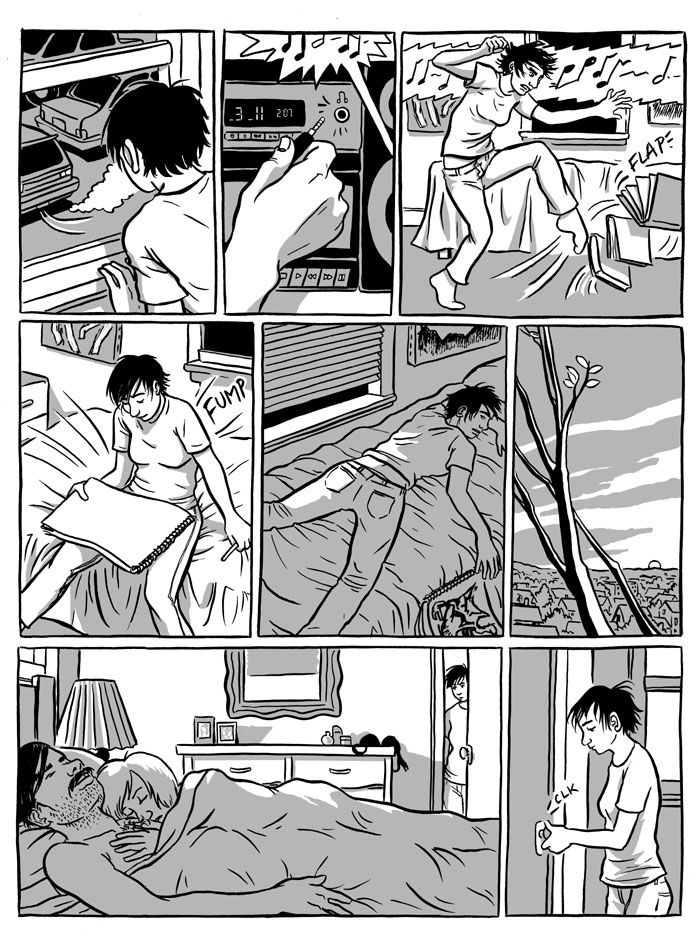Ivy. Sarah Oleksyk (writer and artist). Oni Press. Hardcover, Black & White, 220 pages. $19.99
Kelly: Welcome everyone to the first ever joint review on She Has No Head! - with my friend and yours - Comics Should Be Good blogger Greg Burgas - as we tackle the Oni Press release of Sarah Oleksyk’s Ivy. Originally self-published by Oleksyk as mini-comics, Oni has collected the work and released a fairly gorgeous hardcover edition in February 2011. Because I’m crazy polite (or something) I’ll let Greg kick things off!
Greg: Okay, I’ll start with … a plot review! Ivy is the story of a teenaged girl named Ivy Stenova, who loves to draw, wants to go to art school, but is trapped in a crappy Maine town with adults who don’t understand her and friends she’s losing touch with. At one point, she goes to Boston for an art school convention, meets a charming dude named Josh, and eventually runs away from home with him. So that’s the plot, basically. It’s not extremely important, because Oleksyk is examining high school life and what kids go through, so the plot isn’t all that important.
I can’t really recommend Ivy all that much (I can a bit), even though Oleksyk is a promising creator. It seems as if a lot of creators need to get this kind of story out of their system - maybe not a coming-of-age story per se, but a story that is extremely “personal” and kind of expresses their personal beliefs. Creators can pull this off, but often they don’t, and so a book like this becomes more about the potential of the creator rather than how good the book is itself. Ivy is so very much like an After School Special that I just can’t get behind it completely. I don’t want to get into that too much until you give me your initial impressions, so what did you think?
Kelly: Well, this is going to be much more fun than I expected, because I definitely disagree and recommend it wholeheartedly. I think you’re absolutely right about the
personal feel of the story and the fact that a lot of creators mine this ground, but when it’s done this well I don’t mind it at all. Between the really surprisingly fantastic art (a too frequent rarity in independent comics that cover this kind of ground) and really emotional but for the most part realistically grounded writing, I found a lot to like here. If Oleksyk kept doing this kind of work over and over, kept going back to the well so to speak, I think I definitely would tire of it quickly and I’d like to see her try her hand at something very different next, but for a single standalone work, I think it was great and was an unexpected surprise for me as I’d never heard of Ivy or Oleksyk prior to seeing some chatter about this hardback edition from Oni (which is very pretty in and of itself). Though there are no mind-blowing revelations or insights, I think for anyone that enjoys small personal coming of age stories (though probably especially girls and women) about heartache and growing up there’s a lot to like here.
I think the After School Special comparison is not that far off base, but for me, what makes After School Specials so terrible, are not the ham-handed messages, which if you look are present in almost everything we absorb these days, both good and bad, but some combination of bad writing, bad acting, and bad effects/production values. But for me, Oleksyk’s writing was strong, the drawing (or acting) was strong, and the production values were also strong...so I can’t fault it. I was genuinely moved by a lot of what she did here and found myself relating much more than I would have expected.
Greg: Sure, the art helps this quite a bit, but I don’t think the writing is as strong as you do. One reason I was interested in reviewing this with someone else is that whenever I read something that takes place in high school, I invariably write about my own experiences, and then people call me out because I can’t relate. So I was curious to see if someone else could. My problem with the book is that Oleksyk gives only Ivy any real depth, and while I was impressed that she made her main character thoroughly unlikeable yet still compelling, that doesn’t change the fact that Ivy’s high school experience feels pulled from every “bad cliché” template - there’s the evil teacher who teaches useless shit like math; the sympathetic teacher who teaches cool stuff like art; the mother who got pregnant in high school and desperately wants Ivy to give up her dreams and go to a business school and who sleeps with random men; the father who disappeared; the gay friend whose father abuses him; the boyfriend who seems cool but really isn’t. I’m not saying these things don’t exist in real life, but it seems like everyone takes Douglas Wolk’s statement in the introduction - “high school sucks” - as gospel truth, and I don’t, because for me, high school didn’t suck. Whenever I read something set in high school that shows bad things happening, I need the writing to be more compelling to convince me that these things really happen instead of relying on the “universal truth” that high school sucks. Too many writers seem to take it as a given and take shortcuts, and I think that’s what Oleksyk does in this. For instance, the evil math teacher is such a stereotype that it took me completely out of the story. I never had a teacher that crazy, and when I taught, I never knew a teacher that crazy … even those who privately expressed disdain for students (and I knew some of those, sadly enough). So my question is: Does a crappy high school experience give a reader a shorthand to enter this book and allow Oleksyk to take short cuts in her writing? I suppose you don’t think she does take short cuts, and that’s cool, but I always wonder about this when I’m reading books set in high school that take it as axiomatic that those years suck.
Kelly: Hmm...I guess I didn’t take those characters, which are somewhat extreme in cases and do rely on cliches a bit, as who those people ACTUALLY are but rather Ivy’s flawed perception of them. I can see why it didn’t work for you, but because Ivy herself is such a flawed and often unlikeable (though compelling) narrator, I assumed that her interactions with people were not the gospel of who/what those people actually are, but rather who/what Ivy perceived they were. I thought Oleksyk was doing a rather clever thing with exaggeration to help us see how flawed Ivy’s view of everyone around her was - the math teacher out to get HER, the art teacher trying to help HER, the best friends that are excluding HER, the boyfriend that becomes “salvation” because he likes HER and then subsequently (SPOILERS!) a jerk because he hurts HER...even the girl that she hates, she hates because Ivy perceives the girl doesn’t like HER, but once the girl literally comes into her space and remedies that situation Ivy suddenly sees her differently, and then we as readers get to as well.
It’s funny that the math teacher struck you so, because though I didn’t take her too seriously for the reasons I discussed above, I think the thing that struck me most about those scenes was Ivy’s alarming reactions to them - that was the truly exaggerated part I thought - and the part that showed how damaged Ivy was in her way - how incapable she was of dealing with anything.
High school was actually fine for me. I lived in Utah for my entire high school career (actually starting with 8th grade up through 12th) and it was pretty uneventful for me, in part because Utah itself is uneventful. I was never tortured, nor was I revered. It was mostly, for me, a time for yearning for something else, something significant, and frequently yearning for being someplace else. But because it was Utah, and in part because I was in the small minority at my school that wasn’t Mormon, I didn’t date at all (it wasn’t ALL Utah’s fault...but it’s nice to have a convenient scape goat) and as such I was one of those teens constantly yearning for some romance or boyfriend or crush or something...quite frankly ANYTHING...but perhaps as a true product of my environment I became very cautious...and as such, nothing of significance did happen to me for a long time. If I regret anything about high school and those years, it’s that nothing really happened and my culpability in that. And so, though I had a very different high school experience than Ivy (and different from most people I encounter) I still find myself relating to that aspect of Ivy’s tale particularly - the young urge to fall in love - sadly with anyone halfway decent that wants to pay attention to you - and I was surprised that Oleksyk actually had the relationship come full circle. I feel in many of these kinds of stories, the reality gets softened and characters don’t actually have sex or get cheated on, etc. They often skate close to it and then dodge away, and I was glad to see Oleksyk delve into the good and the bad of it all actually happening. The heights Ivy feels when she believes she’s falling for someone, the decision to take the risk and let herself go (despite some very obvious warning signs), and then the cold reality of that action, but not necessarily regret. And then all of that coupled with the other reality that though things don’t go well for her, it ISN’T actually the end of the world. It all goes on. I liked that about the book quite a bit. It allows Ivy to fall quite far, to actually make leaps without looking, but she then dusts herself off and keeps going.
Greg: It’s good to know that your high school experience wasn’t a long litany of horrible events from which you desperately wanted to escape, even if it wasn’t the greatest time of your life, either. I just get a bit annoyed when people think “high school sucks” is the default setting, because while it’s a weird time, it’s not necessarily the worst time.
Your reading of the book is brilliant, actually, because it clears up a lot of my issues with it - if this is completely Ivy’s perceptions, then it makes sense that she feels persecuted and it ties in with how Oleksyk is making her self-centered and that she had to dig her way out of that. I think the reason I didn’t read it that way is because of the way Oleksyk writes it - the point of view in this book is very much “third person omniscient,” so there’s no reason to believe that what we see is somehow Ivy’s perception rather than what’s actually happening. With Marisa and Brad (her best friends) it’s fairly obvious she’s being selfish, and her animosity toward Charlotte (the girl in her drawing class) is clearly based on her own feelings of insecurity, but because we have no reason to think the “narrator” is unreliable, I took the teacher’s and her mother’s reactions as actually happening. No one really questions Ivy’s version of events - they all see the teacher and Ivy getting into it, and while the scenes with her mother are private, there’s no reason to think it’s Ivy’s warped perceptions of the events and not actually what’s happening. If Oleksyk is going that route, I think that’s a good idea - it doesn’t even have to be too skewed for Ivy to believe she’s being persecuted, because she’s a teenager, which means drama comes easily to her - but I don’t think Oleksyk makes that clear. Was this just a gut feeling on your part that Ivy was viewing these interactions in a slightly heightened state because of how Oleksyk built her up, or is it something more specific?
I do agree with you that Ivy’s affair with Josh was handled quite well, because we can see disaster looming and even Ivy can sort of see it, but she ignores it because, well, she’s in l-u-v. We ignore quite a bit in the throes of teenaged infatuation!
Kelly: Well, I’ll take brilliant any time someone wants to attach it to me, but I think from a technical standpoint, your reading is more accurate. Looking at the book again, there are definitely scenes that point to the POV being third person rather than first (i.e. we see some scenes where Ivy isn’t involved, thus it can’t truly be first person). That said, it still FEELS very personal and first person skewed to me...which I suppose it a failing of the book upon examination...and if I could go back and have Oleksyk do it differently I would suggest that she edit out those scenes or modify them so that it would technically be a first person Ivy POV, rather than push it further to third person, as I think for the subject matter and style of the book first person is better.
I think realizing that Ivy is intended to be third person, not first, and the ramifications of that, as opposed to the way I first experienced it, definitely changes how passionately I feel about it and how successful I feel it is overall, but I still think it’s a really great work that shows a teenage story in a way that few books of this type do, despite the stereotypes and generalizing of some of the characters. All in all, it made me feel and I enjoyed reading it, which I’m sorry to say is far too rare in comics, and so I’d feel happy recommending it to others, even if I now wish I could go in and be her editor a bit to make the execution slightly more cohesively successful.
Greg: One thing that she really nails is when she is more specific and less universal, which is why I don’t dislike the comic. Even though I thought the circumstances of her leaving home were a tad melodramatic (her mother DOES hit her, but Ivy is being a bitch, too), the way her relationship with Josh plays out works very well, because it doesn’t rely on my pre-conceptions like I think some of the book does. Oleksyk just shows us what’s happening, and it’s very effective, because while I don’t think Ivy will change too much too fast, we can see her beginning to understand her effect on others and how she’s treating them because Josh is treating her poorly. Neither Ivy nor Josh is a stereotype when they’re on the road, and it works. It’s obvious that Oleksyk has good writing in her, and that’s why I’m encouraged by this. It’s kind of fun to be there early in someone’s career and compare that work to later work and see how someone evolves.
Of course, the art is very good, too. I know you’re dying to write about that!
Kelly: Yes, the art is excellent as far as I’m concerned, particularly for a first major/collected work. I’m always surprised when an artist this talented just shows up on my radar seemingly out of nowhere - which is to say I’m sure she’s been working hard for years on her craft - but that she appeared to me kind of full formed and crazy talented to my world (you can all read a large excerpt of Ivy here).
Oleksyk’s character design, figure work, and most of all character acting is really great. And her inking and shading is really strong as well. It’s all so well-considered and thoughtful, and yet nothing she’s doing sacrifices clarity in the storytelling, which I really appreciate in comic art. So often these days I feel like clear simple storytelling is lost in the final product. Oleksyk does some clever things throughout with word balloons and sound effects, and Ivy’s sketchbook and art projects that are fun, but if I had to pick a strength it would be Oleksyk’s care with character expressions and thus her storytelling. There are several places where she really leans on the art to tell the story and lets the writing take the backburner and it’s to her credit as a creator that she’s confident enough to do that. She catches some real nuance in the story - especially in the relationship between Ivy and Josh - that is subtle and masterful, and that I think would feel too clumsy or heavy if written. That was probably my favorite aspect of the story - the way she handled the relationship with Josh and Ivy, and though it’s plenty dramatic, with all that goes on, it’s where Oleksyk is the most subtle and it felt very honest to me, which felt like a great reflection of Ivy’s trepidation about the relationship. Ivy very much wants to be consumed by it, wants it to be so much more than it is, but in the end, like so many young relationships I think, it turned out to be of far less substance than she hoped and Oleksyk captured that really beautifully without words. As if Ivy’s words would have betrayed us (and her) and lead us to believe she felt differently, but her expressions, frequently unseen by anyone (including herself), tell us the truth. A truth even she doesn’t want to accept. I thought it was wonderful.
Greg: Yeah, I agree - the art is very impressive. Oleksyk doesn’t give us a strong sense of place in one way - when the action moves from Maine to Georgia, for instance, there’s little difference in the exteriors - but a very strong sense of place in terms of details in the surroundings, from the school to Ivy’s secret spot under the overpass, to the abandoned house they squat in down South. You get a very good feel for Ivy’s world and how, say, her trip to Boston has a big impact on how her borders are expanded. I also like how the people look like regular people - nobody is that attractive; even the “attractive” high school girls are still a bit gawky because they haven’t quite grown into their bodies yet. When Ivy’s mother goes out on her date, she’s not transformed into a gorgeous model, she just looks like a harried single mother in her 30s who put on a nice dress and a bit of makeup. Oleksyk pays close attention to what people wear, and not just what her main characters have on. One thing I do agree is a universal truth about high school is that kids are very deliberate about their clothing in order to make a statement, and Oleksyk pays attention to this even in the extras who populate the school. So yeah, the art is very good, and I hope Oleksyk’s writing skills, which are evident in this comic, catch up.
My final thoughts on Ivy: It’s a decent enough debut by a talented artist who, I think, needs to work on her writing a bit more. Oleksyk obviously has talent in the writing department, but like some other inexperienced writers, I think she relies on readers to supply their own emotional investment in the story rather than taking the time to create that investment. If the reader CAN supply that emotional investment, obviously it works better for them, but if the reader can’t, then the story falls apart a bit. I can recommend the book a little simply because the art is very good and it’s clear that Oleksyk has plenty of talent, but I think she has a lot of work to do. I do think your reading of it has made me a bit more inclined to like it. Who knows if that’s what Oleksyk had in mind, but it works for me!
Kelly: It’s funny, because I think we both came from pretty definitive corners of liking and not liking Ivy, but I think we’ve kind of dragged each other to the center a bit. Which is not a bad thing. I’m glad if I’ve given you some perspective that you hadn't thought of on the book, but I'm equally glad that you've given me a different perspective. After hearing your take I'm looking at it a little more critically and a little less personally and I definitely wish I could go back in time to be Oleksyk's editor and make some red pen suggestions for the collected hardcover edition, things that really would have strengthened the work overall. But the bottomline, I think regardless of our levels of recommendation for Ivy itself is that we’re both really excited about Oleksyk’s future in comics. She’s a big talent and I can’t wait to see what’s next.
This was great fun Greg - and educational - I hope we can do it again sometime!

